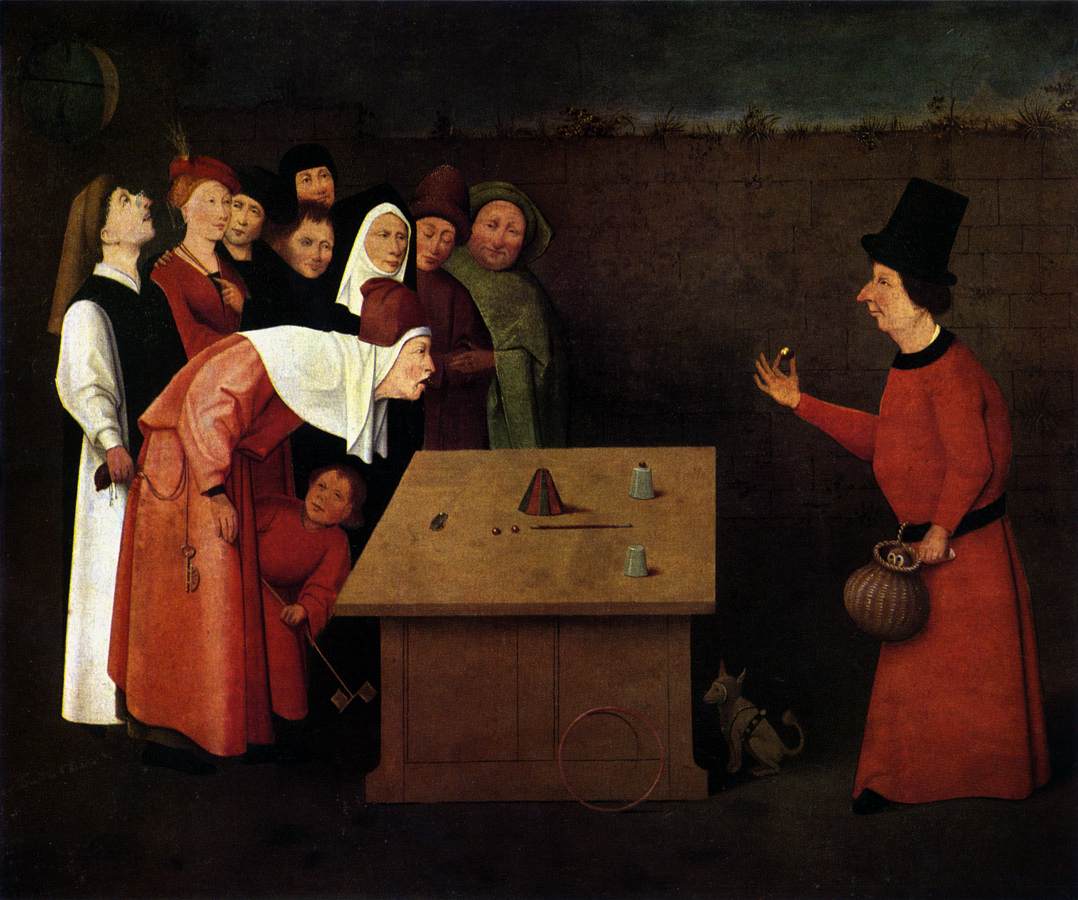Hieronymus Bosch, The Magician (1475-80)
The
universal fanaticism towards a certain magician is unaccountable to many.
Including me, who is neither much of a devotee nor an espouser of the occult, the
art of which, however, has been worming into our society so successfully these
past few years that an expanding faction has been advocating the conviction
that there is nothing too inimical in the occasional practice of magic. There
have even been talks about the remedy of magic being more effectual than that
of any potent medicine, though I’m also obliged to remind the readers that such
anecdote is not yet verified.
A dogged
sceptic notwithstanding, I found myself one day embarking on this by no means
unexpected journey in quest of the illustrious magician, who was described as having
the appearance of a youth, dressing himself in the manner of a priest, holding
in his hand a wand which he pointed heavenward whenever he felt struck by
sudden enlightenment. And that was the moment when the magic began.
Our meeting
was arranged in the magician’s home, which was located in a remote hamlet; the
house itself was grand but aged, the interior spartan but solemn. The magician
was an engaging storyteller, but such charisma was obscured somewhat by his
natural sotto voce and incurable bashfulness when the interview strayed into
realms that were considered too personal to be responded with convincing
details. “Unless I possess of the faculty of prophesying or psychoanalysing,”
the magician said, “I can do none. I only play tricks, so what right have I to
assert myself as if I were a preacher!”
The
“tricks” that the magician considered his stock in trade were, as I later realised,
not some underhand business or sleight of hand that we normally imputed to the
mountebanks. I was astounded to discover that besides performing fantastical
feats to bedazzle the passersby, he was, unbeknownst to most readers I believe,
committing to something charitable that should be worth noting in minuteness
here.
It wasn’t
without reasons that the magician would purchase this house with such
capaciousness. His tone was one akin to archness when he disclosed the secret
of this house- he was not the only resident. I was totally flummoxed and
ill-at-ease when he revealed that the house was replete with his most trusty
companions, who were invisible to human eyes and increasing in number over
years. They were called “hopes,” and yes, the magician was recreationally and
surreptitiously storing hopes.
The “hopes”
were essentially for the disheartened, the demoralised, or whoever that felt
the pressing need of them in any particular periods of their lives. Of all the
clients the magician had been granting the “hopes” with, many managed to
extricate themselves finally from the pickle they’d been enmeshing in from time
immemorial. It was, for the magician, an absolutly joyous sight to see that
sweet smile finally reappeared from the faces of those who were once too
stupefied with misery that their expressions were as insipid as blank papers. But,
the magician also hesitated to add that there were also a number of unlucky
cases, whose new-found “hopes” were like ripened fruits that started their
inevitable process of staling and rotting away before they were utilised
effectively to the desirable end. They continued flailing about in their lives
with no remedies nor answers for their eternally doomed fortune.
“Those are
the faces I cannot bear seeing for the rest of my life, for they are a reminder
of my accursed incompetence in carrying out every task faultlessly so that
every human being can reclaim that happiness that we were once all entitled to
possessing,” the magician said, and heaved a long sigh. “Every time I sensed
those unfortunate people approaching when I was doing magic on the street, I
always halted abruptly the performance and pretended I was preoccupying with
fixing my props until those people finally walked away. Even with their backs I
could see their faces- a painful grimace masquerading as a nonchalant smile.”
“But do you
believe in eternal happiness? Do you think those successful cases, with their
renewed hopes, are immune from ever happening on afflictions in their lives
again?” I asked. The magician thought for some time, then broodingly he said:
“Hope is only a respite designed to forestall the next horrible storm.”

Comments
Post a Comment